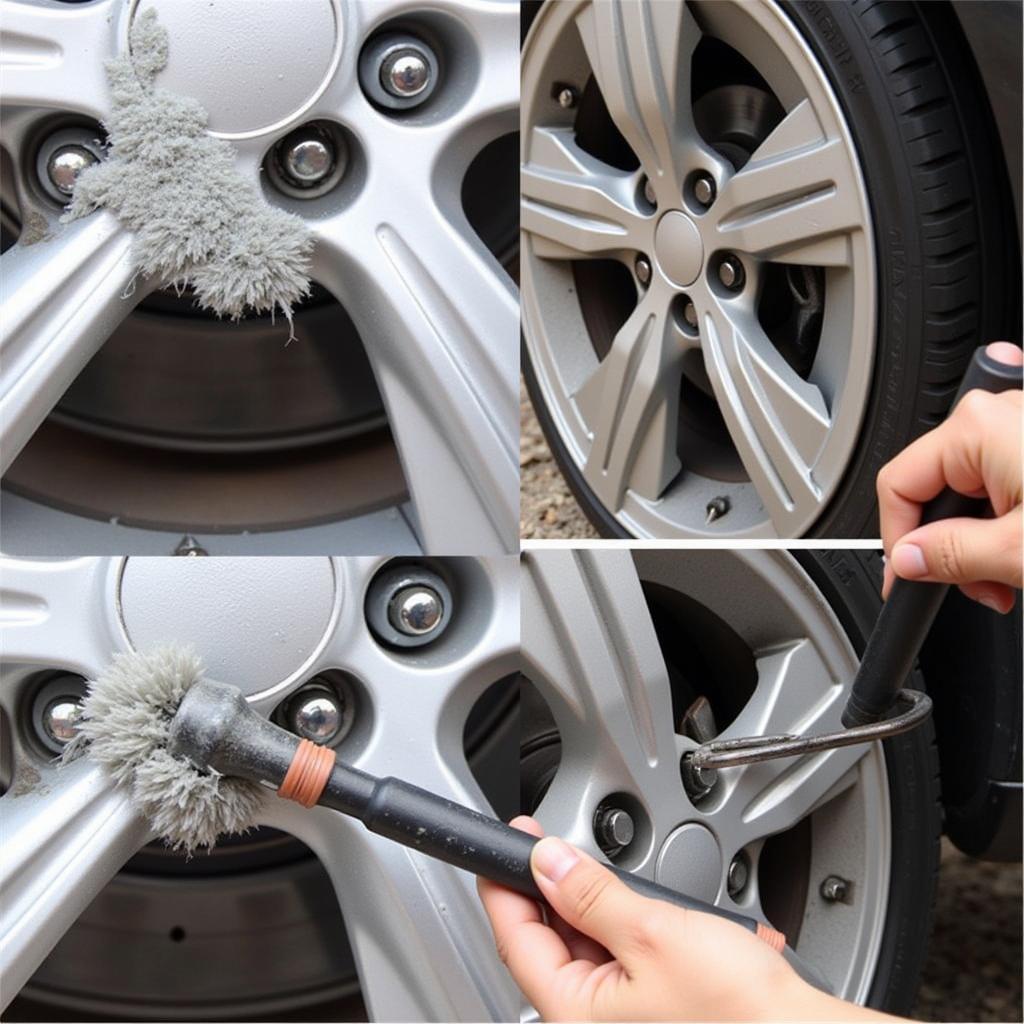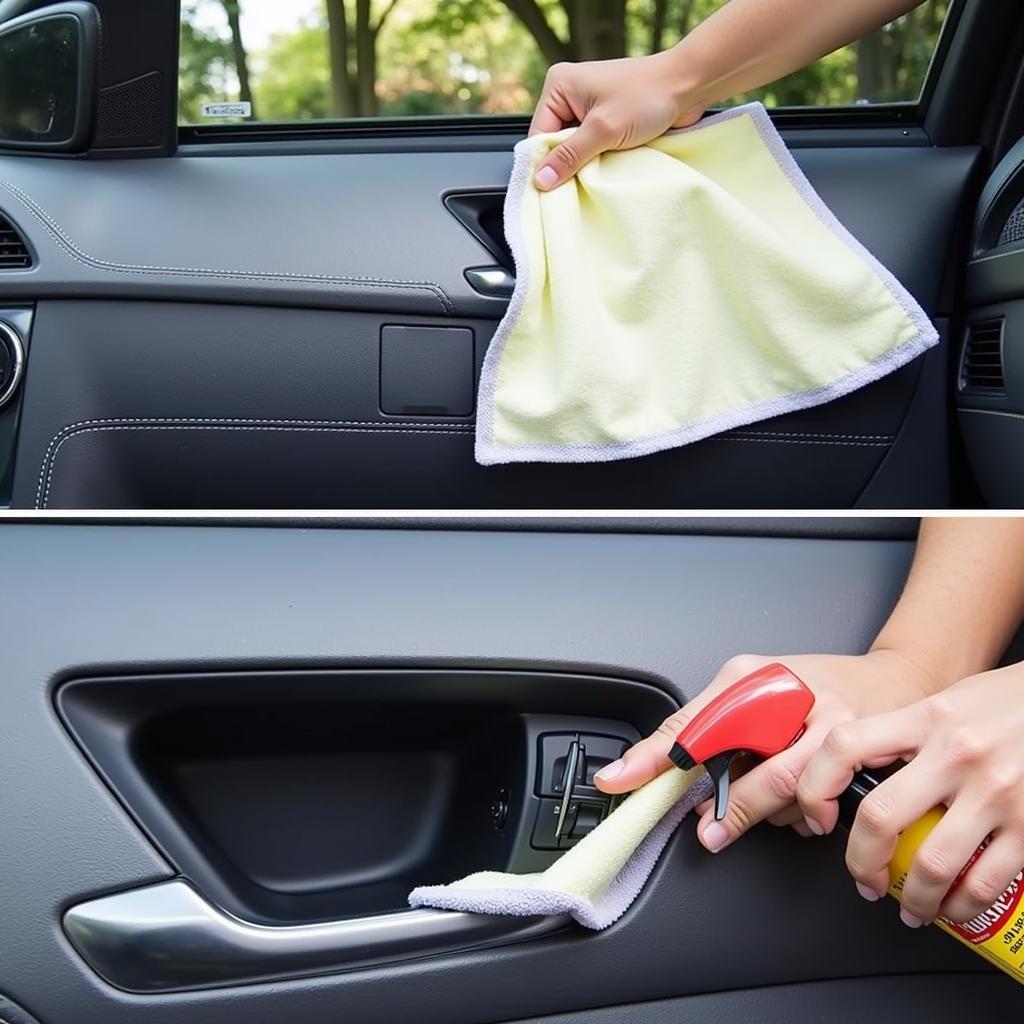Wire brushes play a crucial role in car detailing, offering a powerful cleaning solution for various stubborn grime and rust removal tasks. They are particularly effective on metal parts like wheels, exhaust tips, and undercarriage components. However, it’s vital to choose the right type of wire brush and use it correctly to avoid damaging delicate surfaces.
Understanding the Power of Wire Brushes in Car Detailing
Wire brushes offer a robust cleaning method for areas where regular washing and detailing products fall short. Their abrasive nature makes them ideal for tackling baked-on brake dust, rust, and other stubborn contaminants. However, their strength requires careful consideration and proper technique to prevent unwanted scratches or damage to your vehicle’s finish. Knowing when and how to utilize these tools is essential for successful car detailing.
Choosing the Right Wire Brush: A Comprehensive Guide
Selecting the correct wire brush is paramount for effective and safe car detailing. Different materials, like steel, brass, and nylon, offer varying levels of aggressiveness. Steel wire brushes are the strongest, ideal for heavy-duty cleaning on robust metal parts, while brass offers a gentler approach for delicate surfaces like chrome or aluminum. Nylon brushes are the softest option, perfect for cleaning painted areas without causing scratches. Understanding these distinctions helps ensure you choose the right tool for the job.
Techniques for Effective and Safe Wire Brush Usage
Employing the right techniques is essential for maximizing the cleaning power of wire brushes while minimizing the risk of damage. Always start with the least aggressive brush and gradually increase the strength if needed. Use gentle, controlled motions and avoid excessive pressure, especially on painted or delicate surfaces. Regularly inspect the brush for wear and tear, replacing it when the bristles become bent or damaged to prevent scratching. For delicate areas, consider using a lubricant like WD-40 to further reduce friction and the risk of damage.
 Using a Wire Brush on a Car Wheel
Using a Wire Brush on a Car Wheel
When to Avoid Wire Brushes: Protecting Your Car’s Finish
While wire brushes are valuable detailing tools, certain situations call for alternative methods. Avoid using wire brushes on painted surfaces, as they can easily scratch the paint and damage the clear coat. Similarly, delicate trim pieces, plastic components, and glass should be cleaned with softer tools and appropriate cleaning solutions. Understanding the limitations of wire brushes helps preserve your car’s finish and prevents costly repairs.
Alternative Cleaning Methods for Delicate Car Parts
For delicate car parts, consider using microfiber cloths, detailing brushes, and specialized cleaning products designed for specific materials. These methods offer effective cleaning without the risk of scratching or damaging sensitive surfaces. For example, a soft detailing brush combined with a dedicated wheel cleaner can effectively remove brake dust without the abrasiveness of a wire brush.
 Cleaning Car Trim with Microfiber Cloth
Cleaning Car Trim with Microfiber Cloth
Conclusion: Mastering Wire Brush Use in Car Detailing
Wire brushes can be invaluable tools in car detailing, offering a powerful solution for removing stubborn grime and rust. By selecting the appropriate type of brush and employing proper techniques, you can achieve impressive cleaning results while safeguarding your car’s finish. Remember to exercise caution and consider alternative methods for delicate surfaces to maintain the pristine condition of your vehicle. Using wire brushes effectively enhances your detailing efforts and contributes to a showroom-worthy shine.
FAQ: Wire Brushes in Car Detailing
- Can I use a steel wire brush on my car’s paint? No, steel wire brushes are too abrasive for painted surfaces and can cause significant damage.
- What type of wire brush is best for cleaning chrome wheels? A brass wire brush is generally recommended for chrome, as it’s less abrasive than steel but still effective for cleaning.
- How often should I replace my wire brushes? Replace your wire brushes when the bristles become bent, damaged, or show signs of wear to prevent scratching.
- Can I use a wire brush on my car’s exhaust tips? Yes, wire brushes can be effective for cleaning exhaust tips, but use caution and choose the appropriate brush based on the material of the tips.
- What should I do if I accidentally scratch my car with a wire brush? Minor scratches can sometimes be buffed out with a polishing compound. Deeper scratches may require professional repair.
- Are there any alternatives to wire brushes for removing rust? Yes, chemical rust removers and rust erasers are less abrasive alternatives.
- Can I use a wire brush on plastic parts of my car? No, wire brushes are generally too harsh for plastic and can cause scratches or damage.
Further Assistance
For more in-depth car detailing advice and tips, explore other articles on our website, including guides on paint correction, interior detailing, and ceramic coating application. You can also find information on specific cleaning products and tools to help you achieve professional-level results.
Need personalized support? Contact us via WhatsApp: +1(641)206-8880 or Email: [email protected]. Our 24/7 customer service team is ready to assist you.

Leave a Reply